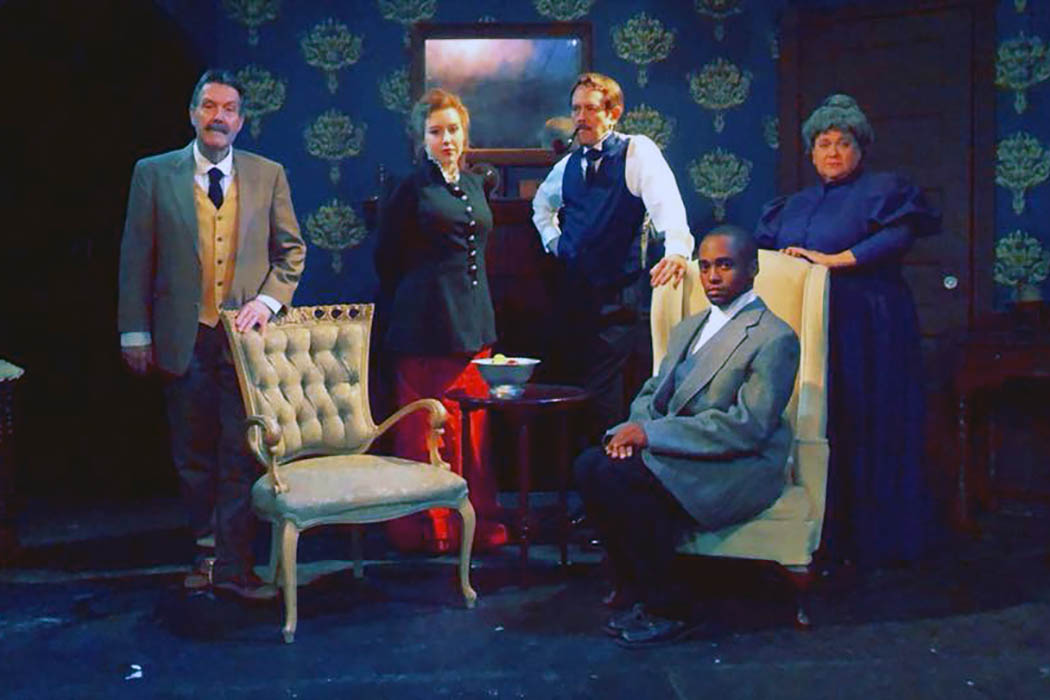Quite possibly the world’s most well known fictional character, Sherlock Holmes was created by Sir Arthur Conan Doyle in 1887 with the detective appearing in four novels and 56 short stories written by Doyle. Since then, the character has been portrayed by a plethora of actors in television and films, apparently defying critics’ protestations of over-saturation in all media.
Although Doyle wrote only one stage play that was produced using the character of Sherlock Holmes—an adaptation of his short story, The Adventure of the Speckled Band—playwrights and producers have not hesitated to contribute, the earliest of which was the notable American actor-director-playwright William Gillette with a play entitled appropriately Sherlock Holmes.
Charles Marowitz’s Sherlock’s Last Case, in current production at Theatre Knoxville Downtown, began life as a one-act play written to fill an empty slot at the Open Space, a fringe theatre organization in London. Later adapted by Marowitz into a two-act vehicle in 1984, the work received a premiere in Los Angeles, working its way through the Kennedy Center in Washington on its way to a Broadway run in 1987 starring Frank Langella as Holmes.
Traditionalists in love with the character and spirit of Doyle’s original stories, or even the Basil Rathbone films or the television series starring Jeremy Brett, may find themselves either quite amused — or substantially bemused — with Sherlock’s Last Case and the surprisingly different depiction of the personalities of Holmes and his colleague, Dr. John Watson. Confronted with a Holmes that is considerably more mean, narcissistic, and snobby, and a Watson who is considerably more devious and petty, the audience is forced to accept that a different theatrical direction is afoot. Nevertheless, Marowitz has certainly provided hard-to-foresee twists for the audience along with that unique take on the characters that is inarguably, if bizarrely, theatrical. On the other hand, some of Marowitz’s anachronisms and other plot oddities seem to be specifically intentional, and hence, puzzling for all the wrong reasons.
Theatre Knoxville Downtown, despite its cramped and under-equipped stage home on North Gay Street, has become quite proficient in making use of local talent and clever stagecraft. In this production, director Candace Moore has cast two actors (Joe Jaynes as Sherlock Holmes and Tom Ireland as Dr. Watson) who more than satisfied the physical expectations of the characters, but who were also delightful in taking the audience on an interesting theatrical journey through delivery of the English language. My only regret is that the bantering between Holmes and Watson often tumbled out so rapidly, both the actors and audience sometimes stumbled upon the linguistic shenanigans.
Although the character of Mrs. Hudson has traditionally been given the task of delivering exposition through the arrival of letters and answering the expected doorbell, Marowitz has used her as a plot point. This Mrs. Hudson has a story to tell and a journey to make sending her away until Act II. Giving Mrs. Hudson some marvelous character traits and subtle humanity was Bonny Pendleton, who painted her character not only as the usual put-upon housekeeper, but as one not immune from a bit of pride, egotism, and self-interest.
Filling out the cast are Emma Wright as Liza and Ben Bean as Inspector Lestrade.
I won’t give away the plot of Sherlock’s Last Case — those making their way to TKD for this production will thank me for not revealing the mystery. However, there is no mystery in the fact that TKD needs the public’s support in their Second Act Campaign, a funding effort to enable the organization to move to a more expansive and usable theatrical space.
Sherlock’s Last Case by Charles Marowitz
Theatre Knoxville Downtown, 319 N. Gay Street
Thursday-Saturday at 8:00 PM; Sunday at 3 PM; through May 6
Tickets and Information






